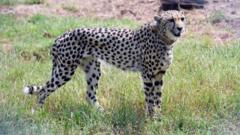The authorities of Kuno National Park in India are taking disciplinary action against a forest employee seen providing water to a cheetah and her cubs, following the emergence of a viral video capturing the moment. This incident, which raises significant concerns about protocol adherence, underscores the complexities of managing the recently reintroduced cheetah population in the region.
Cheetahs, which were declared extinct in India in 1952, were reintroduced to Kuno National Park in 2022, marking a pivotal effort to restore the species. The clip, which started circulating on social media, depicts the worker, who is a driver at the sanctuary, pouring water into a pan after being encouraged by off-screen individuals. The video shows the cheetah named Jwala and her four cubs approaching to drink.
Park officials stated that while it is not unusual for authorized staff to provide water to cheetahs that come close to human settlements, this man's actions were against established protocols, as only trained personnel are permitted to engage with the animals directly. They further emphasized the importance of maintaining a safe distance to prevent potential conflicts between humans and wildlife.
The video initially received positive reactions online, with many describing it as “heartwarming”; however, a significant number of users expressed serious concerns regarding the implications of such interactions. Suggestions have emerged from the community advocating for the construction of ponds and water bodies within the park to provide a sustainable water source for the animals.
As cheetah sightings have been increasing near local villages, tensions have arisen, particularly when livestock has been threatened or lost to the cats. Reports of villagers throwing stones at the big cats to deter them from attacking their livestock have surfaced, leading to heightened awareness efforts by authorities to prepare communities for cohabitation with these magnificent animals.
Since the two-year translocation effort began, 20 cheetahs were relocated from South Africa and Namibia to the Kuno National Park. Tragically, eight of them have died due to various causes, raising alarms regarding the conditions within the park and the competence of the veterinary care provided. Conservation experts from Namibia have raised concerns about insufficient monitoring and lack of experienced personnel, though park authorities have defended their practices, asserting there are currently 26 cheetahs in the park.
Looking ahead, India is set to welcome an additional 20 cheetahs from South Africa, emphasizing the commitment to the species’ restoration while underlining the challenges surrounding their adaptation to the new environment.
Cheetahs, which were declared extinct in India in 1952, were reintroduced to Kuno National Park in 2022, marking a pivotal effort to restore the species. The clip, which started circulating on social media, depicts the worker, who is a driver at the sanctuary, pouring water into a pan after being encouraged by off-screen individuals. The video shows the cheetah named Jwala and her four cubs approaching to drink.
Park officials stated that while it is not unusual for authorized staff to provide water to cheetahs that come close to human settlements, this man's actions were against established protocols, as only trained personnel are permitted to engage with the animals directly. They further emphasized the importance of maintaining a safe distance to prevent potential conflicts between humans and wildlife.
The video initially received positive reactions online, with many describing it as “heartwarming”; however, a significant number of users expressed serious concerns regarding the implications of such interactions. Suggestions have emerged from the community advocating for the construction of ponds and water bodies within the park to provide a sustainable water source for the animals.
As cheetah sightings have been increasing near local villages, tensions have arisen, particularly when livestock has been threatened or lost to the cats. Reports of villagers throwing stones at the big cats to deter them from attacking their livestock have surfaced, leading to heightened awareness efforts by authorities to prepare communities for cohabitation with these magnificent animals.
Since the two-year translocation effort began, 20 cheetahs were relocated from South Africa and Namibia to the Kuno National Park. Tragically, eight of them have died due to various causes, raising alarms regarding the conditions within the park and the competence of the veterinary care provided. Conservation experts from Namibia have raised concerns about insufficient monitoring and lack of experienced personnel, though park authorities have defended their practices, asserting there are currently 26 cheetahs in the park.
Looking ahead, India is set to welcome an additional 20 cheetahs from South Africa, emphasizing the commitment to the species’ restoration while underlining the challenges surrounding their adaptation to the new environment.


















